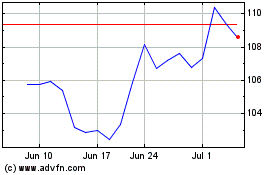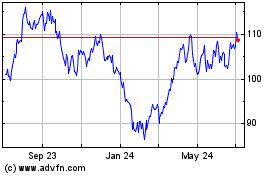Protein Quality Evaluation Method Supports Soy
December 06 2011 - 8:30AM
Marketwired
The importance of protein in the human body is indisputable;
however, the idea of what makes a protein a "quality protein" has
not been as well-understood. A new study from the Journal of
Agriculture and Food Chemistry takes a closer look at the criteria
for determining the quality of a protein. Traditional methods for
determining protein quality have shown most plant proteins, such as
pea protein, are lower in quality than animal-based proteins.
The Food and Agriculture Organization (FAO) and the World Health
Organization (WHO) recommend the protein digestibility-corrected
amino acid score (PDCAAS) as a simple and scientific procedure for
assessing protein quality. The PDCAAS methodology focuses on three
different parameters: the amount of each essential amino acid the
protein contains, how easily the protein can be digested and by
taking both of those parameters into account, whether the protein
meets the FAO/WHO's amino acid requirements set for children aged 2
to 5 years, as they have higher needs to support growth and
development than adults.
"Accurate methods for determining protein quality are key to
helping people plan a healthful diet," said Glenna Hughes, MS,
research scientist at Solae. "Due to the increasing interest in
including plant-based proteins in the diet, accurate information on
protein quality is needed in the literature to demonstrate that a
diet can include quality plant-based proteins."
This study investigated four different food products at two
laboratories and discovered lab-to-lab variations in the amino acid
analysis. Senior scientist, David Ryan, MS looked to uncover a
correction factor that could explain differences in PDCAAS values
between laboratories. The experiment concluded that PDCAAS
determinations should take nitrogen recovery into account to
correct for analytical method error.
Even though literature values and official methodology often
cite nitrogen recovery, it also is helpful to have a repeatable
history of amino acid recovery values on similar products or
ingredients from a validated laboratory for comparison. Solae, LLC
and its legacy companies have a long history of testing protein
quality of soy protein isolates and concentrates, which provided a
context for the current analysis completed with the two different
labs. Nitrogen recovery comparison can be a useful tool in
selecting a lab for amino acid analysis. Data generated in this
study indicated that of the four ingredients evaluated, three
different Solae isolated soy proteins and one Solae soy protein
concentrate have a PDCAAS of 1.00, supporting the position of soy
protein as a high-quality protein, similar to meat, egg and dairy
proteins.
For more information on the study, the following is a link to
the abstract: http://www.ncbi.nlm.nih.gov/pubmed/22017752
Solae, LLC is a world leader in developing soy-based ingredients
for nutritious, great-tasting products. Solae provides solutions
that deliver a unique combination of functional, nutritional,
economical and sustainable benefits to our customers. Headquartered
in St. Louis, Mo., USA, the company was formed through a joint
venture between DuPont (NYSE: DD) and Bunge (NYSE: BG) in 2003.
Solae is a recipient of 2011 Ethisphere's Ethics Inside
Certification and was recognized as one of 100 "World's Most
Ethical Companies" in 2011. For more information, visit
www.Solae.com, or follow the company on Twitter at
www.Twitter.com/SolaeLLC, Facebook at www.Facebook.com/SolaeLLC,
and LinkedIn at www.linkedin.com/company/Solae-LLC.
Add to Digg Bookmark with del.icio.us Add to Newsvine
Contact: Jennifer Starkey 314-659-3145 office 314-341-2958 cell
jstarkey@solae.com
Bunge Global (NYSE:BG)
Historical Stock Chart
From May 2024 to Jun 2024

Bunge Global (NYSE:BG)
Historical Stock Chart
From Jun 2023 to Jun 2024
